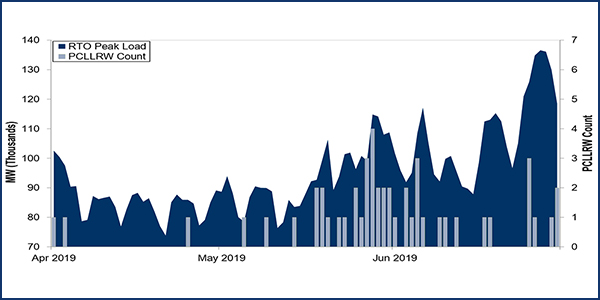PJM staff called June an uneventful month for grid operations, despite 23 emergency procedures — including 21 post-contingency local load relief warnings (PCLLRWs) and three hot weather alerts.
PCLLRWs are utilized in the coordination of post-contingency load shed plans between PJM and transmission owners. June’s events occurred in the RTO’s western transmission zones, including Commonwealth Edison, Eastern Kentucky Power Cooperative, American Electric Power, American Transmission Systems Inc., Pennsylvania Electric, and Duke Energy Ohio and Kentucky. There was one PCLLWR on June 25 in the Atlantic City Electric transmission zone for the Chestnae-Moss Mills line.
The hot weather alerts occurred June 27-29 RTO-wide.
Black Start Packages Coming Together
PJM’s Janell Fabiano told the Operating Committee on Tuesday that stakeholders will soon present new rules for black start resource fuel requirements.
Stakeholders began meeting in July 2018 to reconsider whether the existing fuel requirement of 16 hours proved sufficient given PJM’s focus on resilience in recent years. The group is also considering ways to mitigate high-impact, low-frequency events across all black start resources and fuel types.
Calpine, PJM and Monitoring Analytics continue to work on three similar plans to define fuel assurance and tweak the hourly reserve requirement. Fabiano said stakeholders will bring the three finalized packages to both the OC and the Market Implementation Committee for votes in the fall. Changes will not move forward without support from both committees, she said.
Non-retail BTM Generation Business Rules
Stakeholders delayed voting on changes to Manuals 13 and 14D that refine responsibilities, processes and procedures related to how PJM manages non-retail behind-the-meter generation (NRBTMG). (See “BTM Generation Rules Preview,” PJM OC Briefs: June 11, 2019.)
The revisions to Manual 13 expand upon what events trigger the use of NRBTMG to include “maximum generation emergency” and “deploy all resources” actions, which address capacity shortages or transmission security emergencies.
In Manual 14D, staff updated Appendix A to clarify generator operational requirements for the reporting, netting and operational requirements of NRBTMG.
The delay allows some stakeholders more time to review the revisions. PJM will seek endorsement at the August OC.
Generation Outages
PJM advanced changes to Manual 10: Prescheduling Operations absent the stability-related modifications called into question at the May 14 OC meeting. (See “Generation Outage Revisions Delayed,” PJM OC Briefs: May 14, 2019.)
Stakeholders instead endorsed the remainder of the changes developed out of the periodic cover-to-cover review of the manual that clarifies outage ticket rules for deactivation and black start resources.
Manual Changes Endorsed
Stakeholders unanimously endorsed changes to the following manuals:
- Manual 39: Nuclear Plant Interface Coordination (See “Nuclear Plant Interface Coordination Updates,” PJM OC Briefs: June 11, 2019.)
- Manual 13: Emergency Operations Updates (See “Emergency Operations Updates,” PJM OC Briefs: June 11, 2019.)
– Christen Smith


